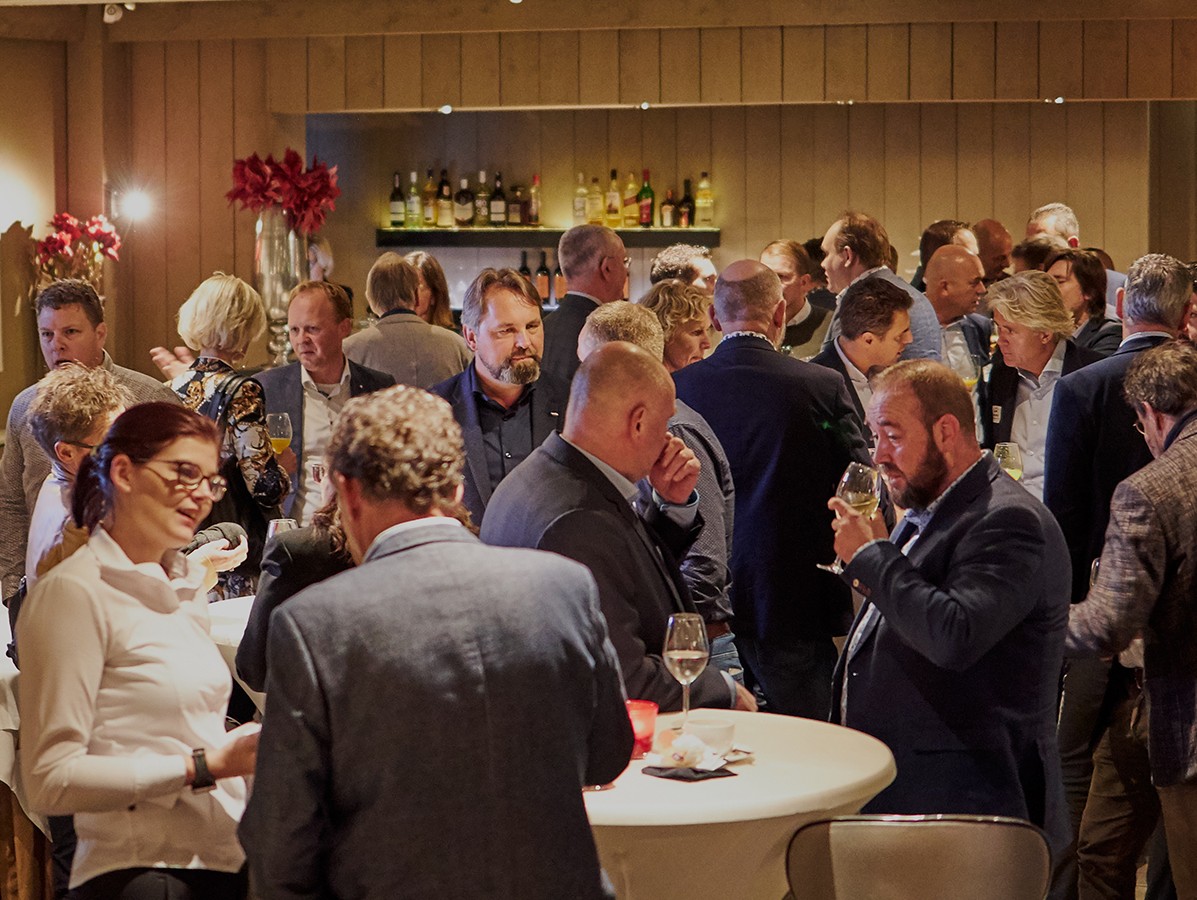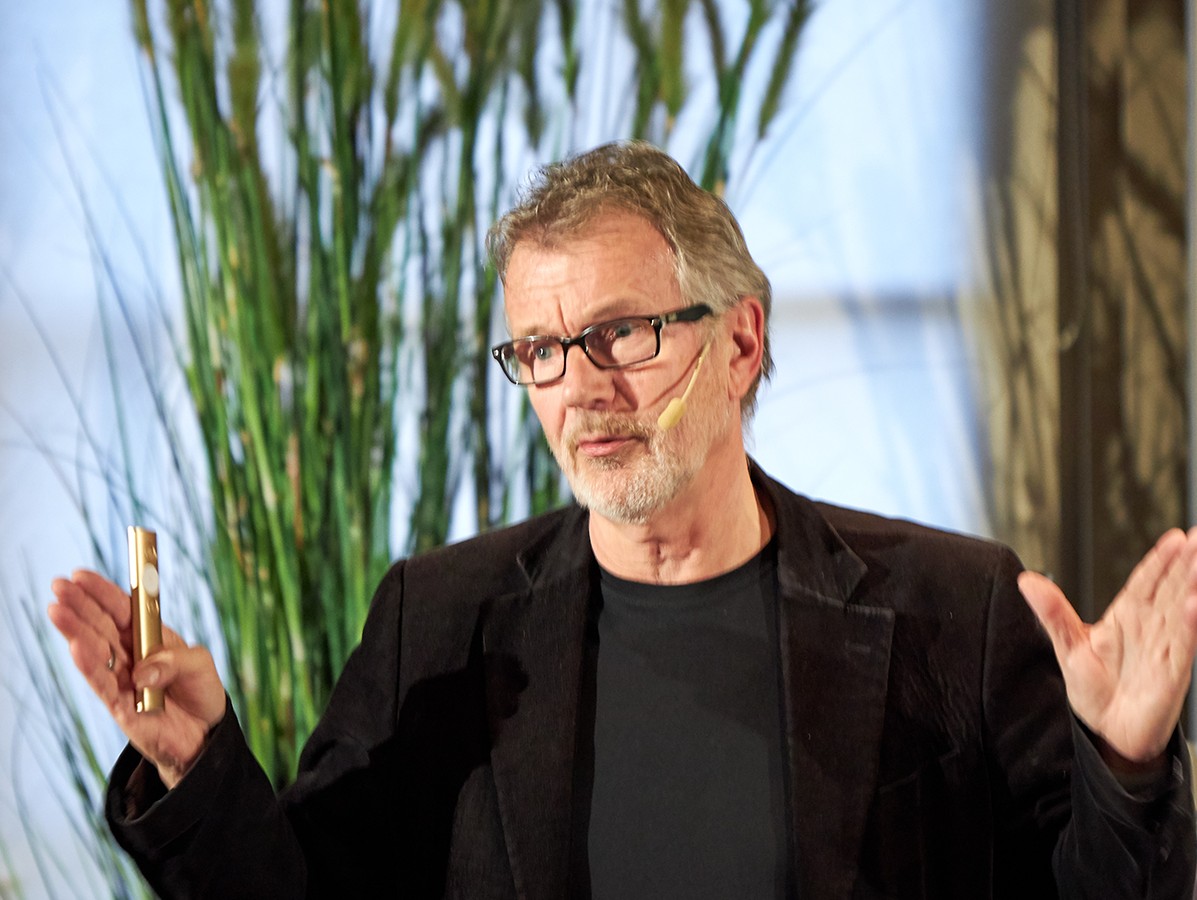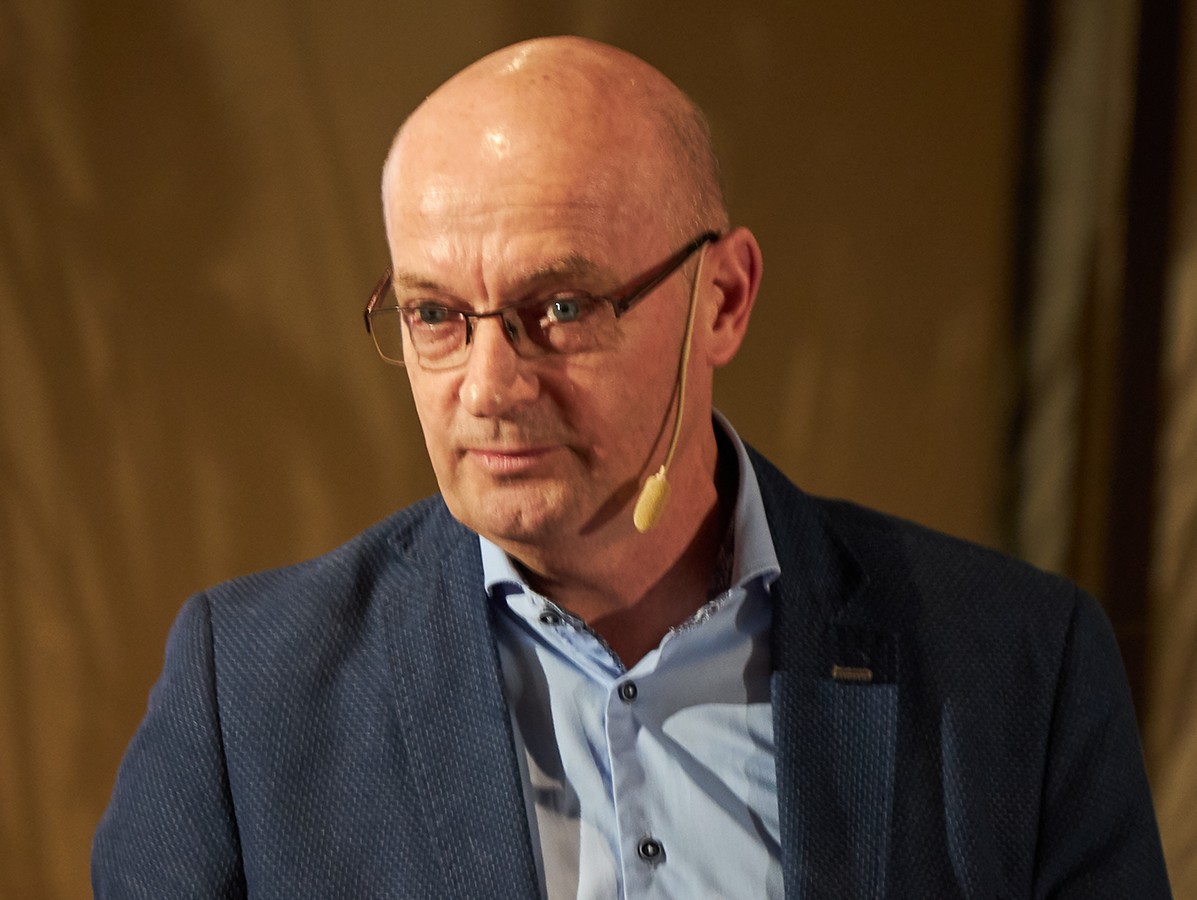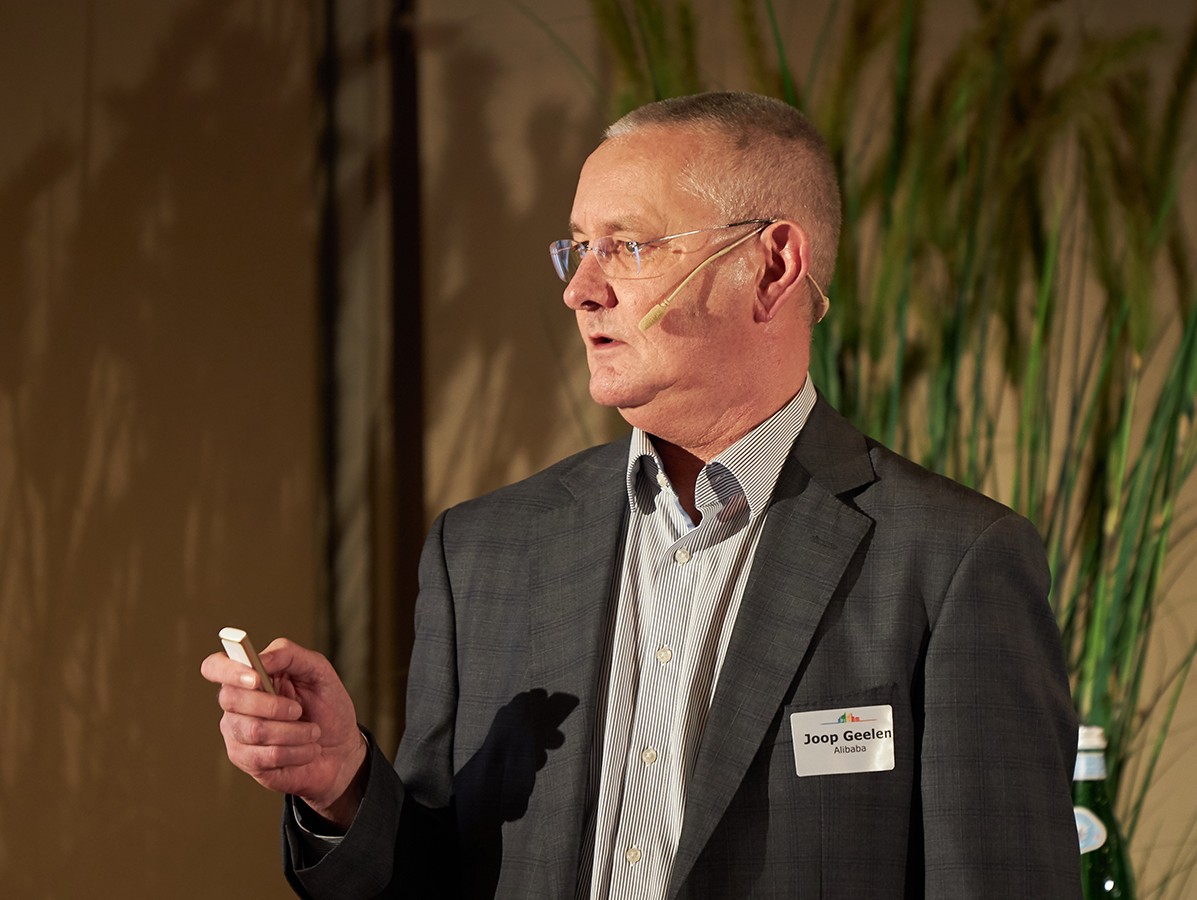
There are many challenges in the food chain. Online is advancing, links are disappearing, retail is upside down. The room is full of decision-makers from food producing companies, side by side with a few retailers. The ears are keen, the senses are on edge: Where are we heading, and what course are we taking?
The world is changing, that's obvious. "Tomorrow it won't work the way it worked yesterday. And after today, everyone is aware that the future began yesterday." This is how Gerrit Grievink, director of Focusplaza, opens the well-attended meeting organized by FoodindustrieExperts: a collaboration of five driven partners, each with their own specialism in the field of weighing, company networks, processing, packaging, transport (planning), software, automation and communication. The joint focus is on optimizing business processes within the (fresh) food industry with the aim of providing a total solution for the customer. An annual knowledge event is an essential part of this overall solution.
Gerrit Grievink emphatically asks for interaction with the audience. "One moment I'm a teacher, the next I'm the student," he says. "Especially in the hallways I learn a lot; also from you." His 'corridors' are barely bounded by walls, as he prefers to walk off the normal paths. Gerrit travels all over the world and also likes to tour his own country with people from all over the world: "When you look through the eyes of a foreigner at what is quite normal for you, you always see new things! His tip: "Go to China for a week. Discover what 'new retailing' is, experience the advance of unmanned techniques. Because you can read about it or listen to it, but you'll never achieve the impact of experiencing it yourself". And that goes for every story you want to share with someone else. "Tell me and I will forget. Show me and I may remember. Involve me and I will understand."
"Retail disruption is in full swing," says Gerrit. "The supermarket has always been an effective logistics operation in which the consumer was the cheapest worker: the order picker who also takes care of the financial processing and logistics from shelf to shelf. That concept is disappearing with the delivery service. It's easy for the consumer, but the system scuffs, cracks and squeaks. Supermarkets that opt for home delivery are prepared to accept the substantial investments. They work very hard to get the logistics system in order, the train rolls, but it is not yet profitable anywhere. The earning model lies in the availability of data, but it hasn't gotten that far yet. I have no idea which way this is going. Albert Heijn is working on an unmanned pilot shop in Zaandam, and Delhaize is also experimenting with it. If we look at China, they have been doing so since 2015. They already have four years of experience and are further developing techniques that are still in their infancy with us. Soon, when 5G arrives, the world will be completely upside down. Then it will no longer be 'mobile first', but 'mobile only'. Anyone who is not visible and findable on the mobile is out-of-business".
Anyone who talks about the changes in society and in retail cannot ignore 'the Millennial', Gerrit continues. "It is the generation born between 1981 and 2000, following generation X (born between 1961 and 1981). They are now 30-40 years old and in many companies the decision-makers and influencers. They certainly do that in a different way than previous generations. You notice this, for example, in the argumentation and in sales talks. People, planet and profit are important to them, but even more important is the p of purpose. It must have a purpose, they want meaning: 'What do I leave with my product for the next generation? What is the story behind the product? Where does it come from? Is the story they tell me true, that I tell myself?' You used to be able to say, "I'm not telling you that," and no one would know. Now there's internet and blockchain and lots of other means and ways to find out the truth. Producers are under a magnifying glass. It is better to be ahead of angry reporting on social media. Be transparent. Show what you're doing. Otherwise it will be useless."

Photo: Gerrit Grievink (Focusplaza)
Anyone that believes he's done when knowing the Millennial and winning them over is wrong. Because 'purpose' is not enough for the next generation either. "Generation Z is also talking about the 'licence to deliver'. Everything you do and say must be embedded in the culture of the company. Are you prepared for that? Are you already responding to that? As of next year, Generation Z will move into your company. They don't come from the moon or Venus, but from faraway undiscovered stars. They look for information differently, read less, and are otherwise concerned with food, trends, social media and making money, they want 'mental convenience' that saves time and simplifies things, avoids hassle, reduces stress and makes them accessible in a healthy way. Immerse yourself in that! Ask yourself what that means for your business and how you can respond to it". He gives some practical examples where the five elements of 'mental convenience' can be found, such as the concept of the packages in the supermarket filled with all the ingredients, including the recipe, to make pumpkin soup or pea soup, for example.
Gerrit has another interesting list that can help keep things on track, in addition to the aforementioned 4 P's and the 5 elements of mental ease. It's the 7 G's; of enjoyment, health, convenience, hospitality, good story, cheap and conscience. "Thinking about how you pick up these 7 points in your company forces you to think 'out of the box'. Look at your position in the market, but not too much at each other. Assume your own strength. Ask yourself the question 'What will my customer or client miss tomorrow if I'm no longer there? If you don't have a clear answer, you're actually unnecessary," he says. "To maintain the p of purpose and the licence to deliver, it is essential to know what makes you indispensable, distinctive and not copyable. That is your added value, the right to exist of your product and/or company. What is new is that you no longer manage this on your own: cooperation is becoming more and more important. So look for co-creation with partners who are different. Complement each other.

Photo: Rutger van den Bout (Hoogvliet BV)
Rutger van den Bout, commercial director of Hoogvliet BV, responds with his story to the importance of the distinguishing factor. Hoogvliet presents itself as innovative. "At the time, we were the first to introduce the pioneering electronic shelf cards, and recently we introduced the 'cool bag' in which products stay cool and fresh for 24 hours. Six years ago, as the 2nd supermarket chain in the Netherlands, we started an online ordering service. Making money is difficult online", says Rutger.
In order to remain innovative and distinctive, the organisation is working hard. Literally speaking: in January 2020 Hoogvliet opened a new 72,000 m2 distribution centre in Bleiswijk, enabling 150 supermarkets - more than twice as many as now - to be supplied. Dry groceries as well as fresh, fruit and vegetables and frozen products are largely automatically processed into shipments to the Hoogvliet stores. The processing of returnable packaging will also take place via this DC. Hoogvliet's central butcher's shop is part of the new building. The company's own bakery is already located in Bleiswijk. "We are investing in robotisation and in data, but certainly also in our staff. For example, we have our own accredited training house where a wide range of mbo and hbo courses are offered. In addition to talent training programmes, we also offer various training courses. Employees with ambition can develop themselves optimally, for example in the field of management or professional knowledge".
The house style has also been renewed. Both the vegetable and liquor departments in the various stores will undergo a complete metamorphosis in the near future, and the fresh produce departments will be equipped with digital poster boards. "With the new house style, we want to tell the story behind the stores and the assortment even more," says Rutger. "For example, about our brand 'Streek' (formerly 'Green Heart') for which the customer even wants to pay a little more. We're going to expand that further in the coming period".
He says he finds it essential to be able to clearly identify your primary target group. "For us, those are families with children. So the Millennial. Secondary target groups are one-person households and people whose children have moved away; the parents of the primary target group. I find it remarkable that for both the primary and secondary target groups, the paper leaflet with offers still plays a major role in orientation, and that the brick supermarket has an important local neighbourhood function. Perhaps this has to do with the fact that Hoogvliet is emphatically not a 'full-service' supermarket. We are a service discounter, proven to be the cheapest."
Although the use of the app is increasing significantly, Hoogvliet's customers do not order online every week at all. "Certainly not when it comes to fresh," says Rutger. "They just don't choose a steak from a picture. They want to be able to inspect fresh products themselves on the spot. Being and staying innovative isn't always easy. Not everything we come up with works or is profitable. You have to keep trying all the time. Sometimes it's trial and error, getting up and moving on with something else."

Photo: Jack Peters (Alibaba Group)
A few times already the country came up for discussion: China. That's where it's happening, that's where the big changes in retail and e-commerce are taking place. Jack Peters, Business, development director of the Alibaba Group, and his colleague Joop Geelen, senior Sourcing Manager Fresh, talk about it. It's an impressive story about the explosive growth of Alibaba. How the whole world is opened up and you can order a Louis Vuitton bag from France with the greatest ease from Northern China. Recently, on Singles Day, all records were broken again. Last year, on this day, Alibaba sold $31 billion worth of goods worldwide, this year it sold over $38 billion. Jack Peters, proud: "And we facilitate that".
On the slide showing the Alibaba ecosystem schematically, we scan the names of the numerous business units: Alimama.com, Alibaba Cloud, Ali-express, Ali-pictures, Yuno, Taobao.com, fresh hippo (hema) and many more. Everything is connected to each other. "This is fundamentally different from Amazon," says Jack. "At Alibaba, everything is under one roof: from logistics to the entertainment channel; from social media to the Ali-pay payment app."
Jack also talks about 'Generation Z'. "It's a generation that no longer listens to the radio and watches television, that hardly reads newspapers or watches leaflets, but can be reached very well via social media. They prefer to listen to a key-influencer. If you can make them fans of your product or shop, you get them moving. Then they do come to your store, or order your products via their smartphone. Mobile is growing explosively in China. Many consumers go directly through an app to a point of sale without ever visiting the website: they order at the click of a finger, pay by facial recognition, and even the Starbucks coffee is delivered to their home. QR codes make everything transparent. "You scan the code and immediately see the factory where your sweater is made, where the pig from which you eat the meat comes from, which permits or food safety certificates have been issued".

Photo: Joop Geelen (Alibaba Group)
China's consumer demand is high. To meet this enormous demand, Alibaba is a major buyer of fresh produce from Europe and North Africa. "We buy enormous quantities of seafood in Norway, meat in the Netherlands and Germany, and pears in the Netherlands," says Joop Geelen. Here, too, origin plays an important role. The certificates must be correct. "They want to know exactly where their products come from. Which ship caught this fish, who was the captain? That's where we're headed."
The message of the two men, racing through the Alibaba network in 20 minutes at a rapid pace, is slightly alarming. China is a growth market, especially when you realise that 82 percent of retail transactions are still taking place offline. In many ways, they are much further ahead than we are in Europe, with countless innovative developments, both on- and offline: with product development, new flavours, far-reaching robotisation and digitisation. And it's also going insanely fast. Many of the products that the Chinese consume are still being imported; and that involves enormous volumes. The next step is to produce in China itself. Think of land-based salmon farming. With newly developed technologies the water quality can already be controlled very well.
Not only being inspired by speakers from the retail sector, but also networking with fellow DGAs/decision-makers from food producing companies is an important part of this event. And what better way to do that than while enjoying good food, during a buffet that is carefully prepared down to the last detail? The evening ended with a dazzling presentation by Erben Wennemars who frankly talks about his career; literally and figuratively a story about trial and error, getting up, continuing and not giving up. He takes us on the journey of his personal development, in which the passion for skating and always wanting to win was a common thread. His reflections on the importance of intrinsic motivation, daring to push back frontiers and not always wanting to be liked, set the audience thinking. After all, these are themes that fit seamlessly with the challenges of entrepreneurship. At the final reception there was still a lot of discussion about it. Make sure you're there next time!
Source: © Foodindustrie Experts